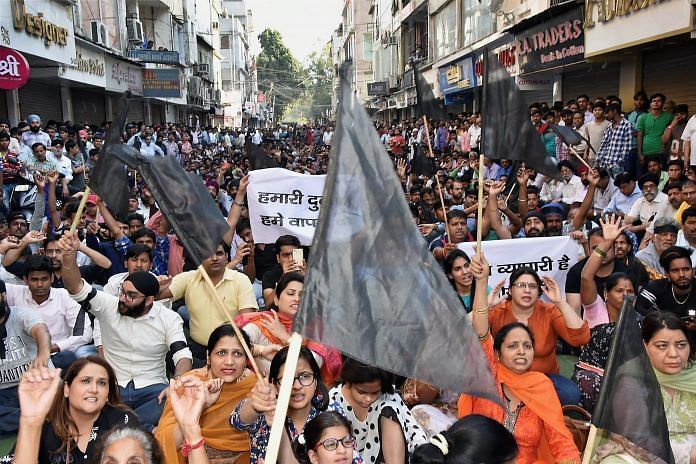Monitoring Committee chief Bhure Lal says unauthorised constructions and jhuggi clusters are allowed by politicians because of ‘vested interests’.
New Delhi: Sheer vote bank politics practised by successive governments of Delhi has ruined the capital in the last 10 years, according to Bhure Lal, head of the Supreme Court-appointed Monitoring Committee that’s leading the sealing drive in the capital.
In conversation with ThePrint, Lal said Delhi would cease to be a liveable city if unauthorised constructions and jhuggi-jhopdi or slum clusters continued to be treated as vote banks by politicians.
The panel has been tasked with carrying out the sealing drive for commercial establishments operating out of residential premises in Delhi, and ridding the city of encroachments. According to data from official sources, while the committee has been successful in sealing 450 such establishments, over 12,000 establishments are still operational, which the committee will continue to seal.
Delhi’s traders went on a city-wide bandh Tuesday to protest the sealing drive, while Delhi chief minister Arvind Kejriwal also called an all-party meeting to campaign for the interests of local traders.
Vested interests
Asked if he was referring to any particular political party, Lal said: “Which political party doesn’t want to create vote banks at the cost of the city, its environment, its river front, its vegetation, its flora and fauna and everything else? These are vested interests. They are not bothered about the general good, they are bothered about their own good.”
The Monitoring Committee was appointed by the Supreme Court in 2006 to look into the burgeoning problems of encroachments and unauthorised constructions in Delhi, especially in residential areas.
Since then, the committee has faced multiple hindrances and pressures from all corners, including governmental bodies, the state and central governments, and politicians.
Changing the Master Plan
A common escape route adopted by those in power is to seek tweaks to the city’s Master Plan, to accommodate the illegalities the committee was mandated to root out, some experts say.
As Supreme Court Justice Madan B. Lokur, noted in a 2017 judgment, the Delhi Development Authority, “which was (sic) apparently uncomfortable to the powers that be… had modified the Master Plan for Delhi on 28th March, 2006.”
Lal, however, said amendments to the Master Plan weren’t a problem, as long as basic amenities in a city, such as toilets, parking spaces, gardens and other civic amenities, were in place.
Abide by the law
Lal acknowledged that the sealing drive was affecting traders’ livelihoods, but said: “The way out is to abide by the law. If they (buildings) want to go vertically up, we have no objections, but it should be according to the scale of the construction.”
Speaking about the ongoing sealing drive in the city, carried out by the municipal corporations, which has agitated politicians and traders alike, Lal said that like tweaking the Master Plan for other interests, authorities can take other decisions, but they would be subject to the scrutiny of the court.
“This committee was not a replacement for the Delhi administration or the local administration,” Lal said. “We don’t want to hit anybody below the belt. We want the shopkeepers and the traders to operate within their boundaries.”
K.J. Rao, former adviser to the Election Commission and a member of the Monitoring Committee, added that the sealing drive will only ensure a better future for generations to come.
“Every shop has government land below them. It is all residential. What conversion charge will they pay when they are not entitled to use it for commercial purposes?” he asked.



